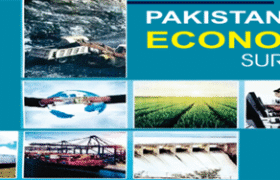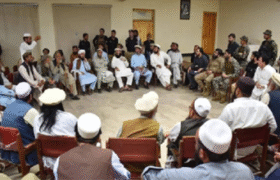Dr. Sahibzada Muhammad Usman
The aftermath of war often leaves countries grappling with the consequences of loss, division, and uncertainty. However, in the case of post-war Pakistan, the end of the recent conflict marked a remarkable transformation for the nation. Far from being a moment of mere cessation of hostilities, it signaled the beginning of a new era characterized by unity, resilience, and a shared sense of national purpose.
The victory not only brought an end to the physical conflict but also sparked an unprecedented wave of national unity that reshaped the nation’s collective identity. This newfound unity was further solidified by the nationwide observance of Yaum-e-Tashakkur, a day dedicated to expressing gratitude and recognizing the sacrifices made by both the military and the citizens who stood steadfast in the face of adversity.
The initial response to the victory was a sense of elation and relief, but as the weeks passed, it became clear that this triumph had far-reachingimplications beyond the battlefield. The war, which had once seemed like an insurmountable challenge, had united the country in ways that were previously unimaginable. The diverse ethnicities, religions, and regions of Pakistan, which often found themselves at odds, came together under the banner of national pride. In a society marked by internal divisions, the war forged a sense of collective identity that transcended the differences that had long been a source of discord. This unprecedented wave of unity was driven by a common cause of defending the sovereignty of the nation and upholding its honor. As the victory became a symbol of resilience and strength, the citizens of Pakistan found themselves bound by a shared sense of purpose, one that was forged in the crucible of conflict and tempered by the sacrifices of the war.
One of the most poignant expressions of this newfound unity was the nationwide observance of Yaum-e-Tashakkur, a day set aside to commemoratethe sacrifices made by the nation’s armed forces and the civilian population. The day was marked by solemn ceremonies, public gatherings, and moments of reflection across the country. For the first time in Pakistan’s history, the entire nation came together to acknowledge the collective efforts that had contributed to the country’s survival and eventual victory.
 Youm-e-Tashakkur was not merely a day of remembrance; it was an affirmation of the country’s resilience in the face of adversity and a recognition of the strength that lay within its people. The observance of this day served as a powerful reminder that the sacrifices of the war, though painful, had not been in vain. It reinforced the belief that unity was not just a fleeting sentiment but a lasting force that could shape the future of the nation.
Youm-e-Tashakkur was not merely a day of remembrance; it was an affirmation of the country’s resilience in the face of adversity and a recognition of the strength that lay within its people. The observance of this day served as a powerful reminder that the sacrifices of the war, though painful, had not been in vain. It reinforced the belief that unity was not just a fleeting sentiment but a lasting force that could shape the future of the nation.
The war may have ended, but the spirit of national resilience that emerged from the conflict has continued to shape Pakistan’s trajectory. The aftermath of the war saw the country undergoing significant social, economic, and political changes. The victory instilled in the people a renewed sense of hope and determination.
The country, once fractured by internal divisions, began to show signs of healing as communities that had once been divided by ethnic, regional, and ideological differences found common ground. The shared experience of the war, coupled with the sense of triumph, provided the foundation for a national revival that extended beyond the military victory. The citizens of Pakistan, emboldened by their collective success, began to view their country in a new light. They recognized that the strength of the nation lay not just in its military might but in the resilience of its people and the unity that had been forged through the trials of war.
The new spirit of resilience was evident in the way the nation approached the challenges that followed the conflict. Faced with the task of rebuilding infrastructure, restoring economic stability, and addressing the social impact of the war, the people of Pakistan approached these challenges with a renewed sense of purpose. The sense of unity that had been born during the war became a driving force in the nation’s efforts to rebuild. This collective effort was not only a testament to the resilience of the people but also to the enduring spirit of national solidarity that had emerged from the war. Pakistan, once torn by internal strife, now faced its future with a newfound sense of optimism and determination, aware that the strength of the nation lay in its ability to unite and overcome adversity.
The victory had also instilled a sense of national pride that transcended the military domain. It became clear that the country’s strength was not solely derived from its military forces, but from the unity of its people. As Pakistan moved forward in the post-war period, this sense of pride and unity became a defining characteristic of the nation. The government, recognizing the importance of this unity, worked to strengthen the social fabric of the country by fostering an environment of inclusivity and national cohesion. Efforts were made to bridge the gaps between different regions and communities, and policies were implemented to ensure that all citizens, regardless of their background, felt a sense of belonging and ownership in the nation’s future.
Conclusively, the post-war period in Pakistan represents a transformative phase in the country’s history. The victory not only marked the end of hostilities but also heralded the beginning of a new era defined by national unity and resilience. The wave of unity that swept across the nation following the victory, coupled with the nationwide observance of Youm-e-Tashakkur, laid the foundation for a renewed sense of collective purpose. The war may have ended, but the spirit of resilience that emerged from it continues to shape the future of Pakistan. As the country moves forward, the lessons of unity, sacrifice, and national pride will remain central to its identity and its aspirations for a stronger, more united future.





